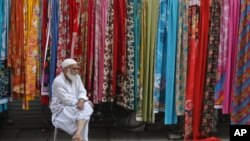Businessmen and analysts see this week's decision by Pakistan to grant India "Most Favored Nation" trade status as a major breakthrough that could ultimately pave the way for the rival nuclear-armed neighbors to settle differences over long-running bilateral disputes, including Kashmir.
Pakistan’s decision to grant India much-awaited "Most Favored Nation," or MFN, trade status has cheered up the Pakistani business community.
Amid concerns about possible threats posed to relatively small industries, Pakistani business leaders are expressing optimism that liberalization of trade would open vast opportunity for their businesses, particularly in the textile sector.
Amin Hashwani is the president of the Pakistan-India CEOs Business Forum, a group comprising Indian and Pakistani business leaders.
“From Pakistan point of view we get a market which is eight to nine times bigger than us," he said. "So if you look at [it] theoretically, Pakistan should benefit more than India; in terms of exports provided, we get a level playing field. Pakistan has a great advantage in textiles and India has a huge domestic market, so if we can get access to that market, Pakistanis will be able to export at least a couple of billion dollars worth of exports into that market."
India has already granted MFN status to Pakistan.
Businessmen like Hashwani say that while bilateral political disputes, including Kashmir, had until now prevented Islamabad from granting the same status to New Delhi, Indian restrictions on Pakistani exports have also been a major discouraging factor.
“What is important also is that the Reserve Bank of India [India's central bank] should remove its restrictions... preventing Indian companies to have joint ventures with Pakistani companies or in Pakistan, Hashwani said. "So if we can have investments, joint ventures complementing the trade, it could both have a positive effect on each other and we could certainly see billions and billions of dollars, at least [a] four to five times increase in trade volumes.”
Analysts, such as professor Swaran Singh of New Delhi’s Jawaharlal Nehru University, believe the rival South Asian nations could build on this economic relationship to sort out more complicated issues that have strained bilateral ties for decades.
“It will definitely benefit the trade relations, and trade relations in inter-state affairs, whenever there are complications, are seen as most reliable and most dependable pillar of rapprochement between nations," said Singh. "So I think it is a very important, very timely gesture and it should lead to several other positive initiatives being followed from here.”
Right-wing parties have criticized the Pakistani government for granting "Most Favored Nation" status to India, saying the move will undermine the country’s stance on the Kashmir dispute.
Professor Ibrahim Khan of the Jamaat-e-Islami party is a member of the Pakistani Senate.
“If there are issues to be resolved with India, India should not be declared as the most favored nation," said Khan. "But if India is declared as MFN, then the issues are worthless. The government is not acting according to [the] benefits and interests of Pakistan.”
However, Pakistani foreign ministry spokesperson Tehmina Janjua dismisses concerns that normalization of trade ties with India amounts to compromising on Islamabad’s stance on Kashmir and other issues in dispute with New Delhi.
She told reporters that the recently resumed wide-ranging dialogue between India and Pakistan is aimed at establishing peace and prosperity in the region.
“And that clearly indicates that Pakistan and India both agree that friendly ties between Pakistan and India are important and critical for development of the region, for (the)development and prosperity of the people of Pakistan and India," Janjua said.
The annual volume of trade between Pakistan and India is currently around $2 billion, of which Pakistan’s share is just 14 percent.
During recent talks in New Delhi, trade ministers from the two countries announced visa concessions for businessmen on both sides and pledged to increase the annual trade volume to $6 billion within three years.




